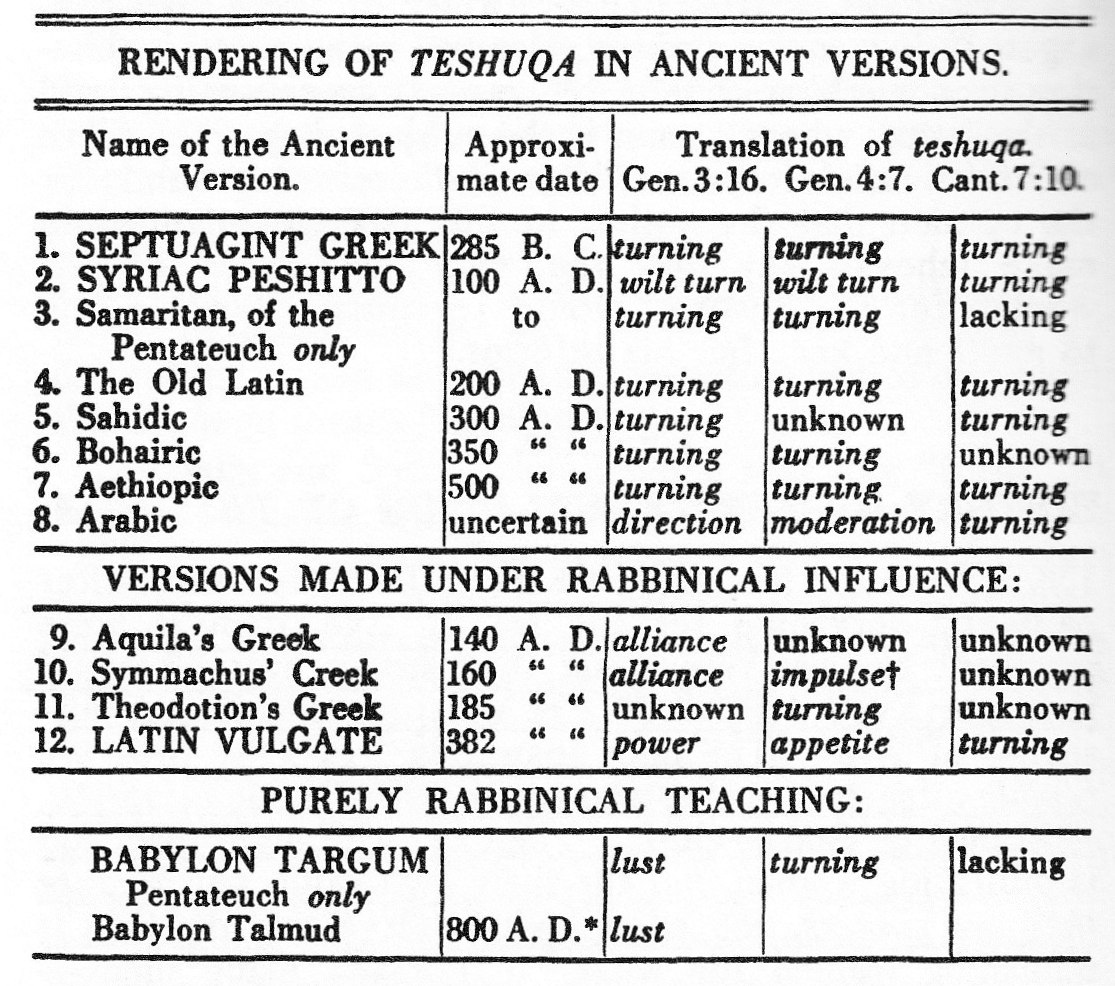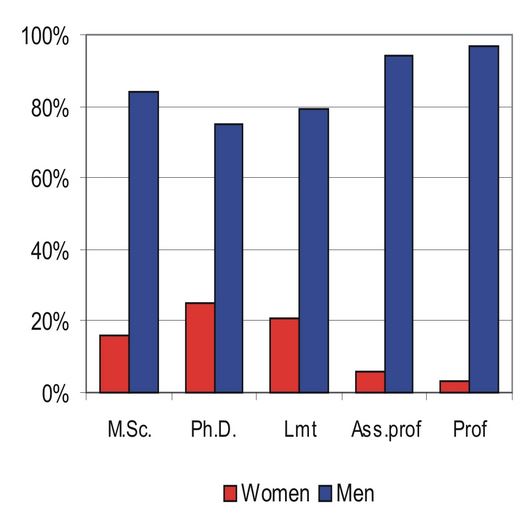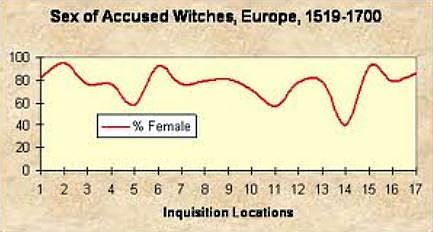 Simple changes in translation can make a BIG difference. Notice, as I begin to bring these changes to the forefront, that all the wrong renderings of words in Scripture affect women and their roles to men. Do you think this is a coincidence? The following, unmasks one of the Church’s lies regarding women and, male dominance over women. The following excerpt draws attention to the undeniable inconsistency existing between what theologians THINK something means and what close examination of the original Hebrew reveals. This research is the result of a Greek and Hebrew scholar, physician and missionary, Katherine Bushnell, written in 1923. Since women have born the brunt of such oppression and abuse throughout history, it is imperative that EVERY man and woman the WORLD over knows where the corruptions lie and how they came about. We must set right, what has been rendered wrong and give women back, their autonomy, honor, dignity and equality. It is only RIGHT that current translations be revised to reflect the true renderings, thus ending the suffering that women are enduring under the exacting and heavy hand of religion everywhere.
Simple changes in translation can make a BIG difference. Notice, as I begin to bring these changes to the forefront, that all the wrong renderings of words in Scripture affect women and their roles to men. Do you think this is a coincidence? The following, unmasks one of the Church’s lies regarding women and, male dominance over women. The following excerpt draws attention to the undeniable inconsistency existing between what theologians THINK something means and what close examination of the original Hebrew reveals. This research is the result of a Greek and Hebrew scholar, physician and missionary, Katherine Bushnell, written in 1923. Since women have born the brunt of such oppression and abuse throughout history, it is imperative that EVERY man and woman the WORLD over knows where the corruptions lie and how they came about. We must set right, what has been rendered wrong and give women back, their autonomy, honor, dignity and equality. It is only RIGHT that current translations be revised to reflect the true renderings, thus ending the suffering that women are enduring under the exacting and heavy hand of religion everywhere.
Gen 3:16 Unto the woman he said, I will greatly multiply thy sorrow and thy conception; in sorrow thou shalt bring forth children; and thy desire shall be to thy husband, and he shall rule over thee.
The correct rendering of Gen. 3:16:
Unto the woman he said, I will greatly multiply thy sorrow and thy conception; in sorrow thou shalt bring forth children; thou art turning away to thy husband, and he will rule over thee,”
“The usual construction put upon the language of the first verse fits accurately nowhere; the correct interpretation of the second verse fits all around. The original word used here is teshuqa and only occurs three times in the Hebrew language. From this, we can conclude that its sense must be fixed by studying its relation to other words in the sentences where it occurs. We can also study its derivation and structure and the way it is rendered in the ancient versions of Scripture.
Gen. 3:16 – “-and-to-Adam” – Eve’s teshuqa”
Gen. 4:7 – “-and-to-Cain” Abel’s teshuqa” – (or perhaps sin’s teshuqa)
Sol. Song 7:10, “-and-to-the-Church Christ’s teshuqa” – (as usually interpreted)
Comparing these, we find there are no verbs expressed. The conjunction is one for all, as is the preposition. This is true of the Hebrew original also. In fact, there is variety in the three sentences, excepting in the proper nouns implied in the pronouns used. The sense of the three passages must then, be similar.
All the stress of teaching woman’s supposed obligations to man is in the “shall be,” which is SUPPLIED by the translators. The force of the mandatory teaching, then, rests upon a hiatus in the sentence. A hiatus is defined as: A gap or interruption in space, time, or continuity; a break.
If we conclude that the context proves that this is an imperative, then the previous sentences must be imperative, or the following occurs:
- MUST women bear children in sorrow, whether she wishes to rejoice or not?
- MUST the serpent bruise the heel of the woman’s seed, whether he will or not?
- MUST man rule woman, whether he will or not?
If this be the commandment of God, and a man must rule women, the more carnally-minded a man is the better he keeps that sort of “law!” But the Apostle Paul said: “The carnal mind . . . is not subject to the law of God, neither indeed can be” (Rom. 8:7). Thus we see that the context does NOT prove that this “shall be” of the sentence translated, “thy desire shall be to thy husband” is imperative. We can assert positively that this sentence is a simple future or present, warning woman of the consequences of her action. So it is rendered in all the ancient versions; never as an imperative. As a prophecy it has been abundantly fulfilled in the manner in which man rules over women, especially in heathen lands. But Jesus Christ said, as much of women as of men: “NO ONE can serve two masters.”
The word teshuqa does not necessarily refer to the appetite between male and female, either, because it would then be out of place in the second sentence. It does not necessarily imply the subordination of Eve to Adam, as many religious leaders imply. If it did, then the third sentence would make Christ subordinate to the Church; or, according to the other interpretations of the Song of Solomon, the man is, at any rate, subordinate to the woman.
Nicholas Fuller, an eminent Oriental scholar, wrote an interesting chapter on this subject in a Latin work entitled Theological Miscellany, published in 1612. In reply to those who hold that the sense of the passage is, “the appetite of the wife is about to be in the power of the husband and subdued by him,” he says: “Just as if the nothing would be longed for by the wife excepting what would be pleasing to the husband. Absurd notion! Others again wish the appetite to be understood as that by which woman seeks marital dominion. And yet it is not very probable that this yoke is sustained by spontaneous longing for it . . . This is not effected by longing, then, but it is suffered because it is not declined. Besides, Scripture saith NOT, “The appetite of the wife shall be inclined to the dominion of the husband,’ but ‘to the husband’ himself. Wherefore, if teshuqa is allowed to be translated ‘appetite’ certainly this appetite is common and by nature reciprocal, and bending each in like manner to the other. Therefore, it displays a more equitable condition of life than dominion. Nay, moreover, if this form of speech declares the appetite for a ruler, Christ would adopt the Church as His ruler, for in the same manner the Church speaks, when, of Christ as a Spouse, in Canticles 7:10 it says, ‘I am my beloved’s, towards me is His appetite,’ as indeed they would there translate.”
Also, Lewis’ note in Lange’s Commentary declares: “The sense of this word [teshuqa] is not libido, or sensual desire.”
As to the structure, and derivation of teshuqa, apparently it is derived from the verb shuq, meaning in its simplest form “to run.” The prefix, te, gives the word and abstract sense, and it corresponds to our termination – “ness” in such words as “goodness,” “kindness,” etc. The ending a, is added to give the word the feminine form usual to Hebrew abstract nouns. If this word is taken from the intensive form of the verb, it would bear the sense “to run repeatedly,” that is “to run back and forth.” But to keep running back and forth would necessitate frequent turning, and hence the word might easily have the derived sense of “turning;” and an abstract noun be derived therefrom, not meaning a literal “turning,” but a quality of the character, a “turning.” The sense “desire” has come to us from the Talmud, in the “Ten Curses of Eve.” All the most ancient versions, give the idea of “turning,” and that alone, for this Hebrew word “teshuqa.”
The Pentateuch of the Septuagint is especially esteemed for its accuracy. This version renders teshuqa into the Greek word apostrophe in both passages in Genesis: and epistrophe in Canticles. The former word, apostrophe, is familiar to us all: it means “turning away,” and the latter, “turning to.” The teaching is, that Eve is turning away from God to her husband, and, as a consequence of the deflection, Adam will rule over her. All ancient manuscripts without any exceptions whatever, give no other sense by “turning” for teshuqa.
Now, as to some variations in the rendering of the passages in Genesis: The Talmud, as stated earlier, sets for the teaching that God pronounced “Ten Curses” upon Eve; but the Talmud is not a translation of the Scriptures, but a compilation of the TRADITIONS of the Jews. The fifth, sixth and ninth of these “curses” supply the sense “lust” for the Hebrew of these “curses” together with the teaching that woman must center her “desire” upon her husband alone; his “desire” could wander away to other women. From this immoral teaching the English rendering has its sole original authority.
Jerome’s LATIN VULGATE was made about 382 A.D. He went to Palestine and studied Hebrew under Jewish rabbis. He renders the first passage, “Thou shalt be under the power of a husband, and he will rule over thee.” The first phrase is mere guess-work; it is no translation of the original words. The second passage reads “his appetite,” — whatever that may mean in a relation between brothers. The third passage reads, “his turning.” The ARABIC is of the most uncertain date; probably not earlier than the tenth century. It renders the word teshuqa in the three places, respectively, “direction,” “moderation” and “turning.”
A TARGUM is not a translation, but a paraphrase, — the Synagogue explanation of the sense of Scripture. The TARGUM of ONKELOS, or Chaldee Paraphrase, was published at Babylon, and therefore would conform quite closely to the traditions embodied in the Babylonian Talmud which teaches the “ten curses of Eve.” This Targum–the mose reliable one–relates only to the Pentatuch. It renders, “lust” in the first passage, and “turning” in the second. A very unreliable Targum, accredited wrongly to “Joseph the blind,” of about the eleventh century, renders “lust” in the third passage.
Wiener says: “The coincidences of truth are infinite. In other words, the true hypothesis explains ALL difficulties.” Let us apply this scientific test to our claim that teshuqa means “turning:”
Aquila and Symmachus assume that Eve “turns” to make an alliance with her husband, hence they translate “alliance.” Or, according to other readings, Symmachus assumes that the “turning” is rather, as yet, an impulse, than an act, — he translates “impulse.” (This Greek word for “impulse” does not necessarily imply a sensual impulse. It is used in Acts 14:5, and translated “assault,” and in James 3:4, – not rendered in the A.V., but the R. V. reads: “whither the impulse of the steersman willeth.”) The Arabic reasons, “If Eve is about to turn away from God, it must be in some direction;” so it renders, “direction.” Jerome plainly shows he does not know what teshuqa means, but since the latter part of the phrase refers to the man’s part, — “he will rule over thee,” — he concludes that the beginning of the passage must refer to woman’s position, and renders, “Thou shalt be under the power of a husband.”
Likewise, the sense “turning” reconciles the three passages one with another, whereas the sense “desire” puts them in utter conflict. Eve is “turning” from God, and He warns her that if she does this, she will fall under the dominion of Adam. Abel is “turning” toward Cain, in all the confidence of a younger and unsuspecting brother. God warns Cain prophetically that this confiding approach of his brother will be a temptation to slay him in his defenselessness. The third passage is a joyful boast of the bridegroom’s favor and attention, “He is turning to me.”
Prof. H.G. Mitchell of Boston University, in his book, The World Before Abraham, has well represented the general sense of the phrase translated, “thy desire shall be to thy husband.” He says, “This interpretation, however, is not altogether satisfactory. the word here used is found only in two other places int he O.T., Gen. 4:7 and Cat. 7:10. In the former of these two passages, if it means anything, it must mean mere inclination, or something equally removed from sensuality: and in the latter, where a man is the subject, it has the force of affection, devotion. there is therefore ground for the opinion that the author in this passage intended to make Jehovah say that the very tenderness of the woman for the husband would [eventually] enable him to make and keep her his inferior.”
Were the teaching true that all women must suffer pain and servitude for the sin of Eve, then it would be pertinent to ask ourselves, “Why must we suffer?” Is it because we are Eve’s offspring? Aren’t men equally Eve’s offspring? The only conclusion we can draw is that it’s because we are FEMALE offspring. But who made us female offspring – Women or God? GOD. If God made us females, then is he punishing women, not because of our own fault, not because we are sinners, not even because Eve sinned? In reality, God would be punishing women for what He Himself made us – because we are women and not men. This has to be one of the most vicious attacks on God’s reputation for justice that we have ever heard. The idea that “sorrow” in this verse means labor pains, or periodical suffering in women, is far-fetched. The same word is used of Adam in the very next verse. This word is not used for such suffering anywhere in all the Scriptures.
Since this passage in Genesis, “Thy desire shall be to thy husband,” has been the cause of much immorality among men, in the cruelty and oppression they have inflicted upon their wives; since this false translation has been the cause of much degradation, unhappiness and suffering to women; and since this translation has been made the very keystone of an arch of doctrine subordinating woman to man, without which keystone the arch itself falls to pieces; and since the Apostle Paul’s utterances on the “woman question” are always interpreted as though this perversion of the sense of Gen. 3:16 was his accepted foundation upon which he builds his super structure, it behooves us to review again the history of the ancient translation of the word teshuqa, and this we will do with the aid of the appended table:
 From this Table we readily see that of the twelve ancient versions, 10 furnish us with the rendering “turning”, in at least one passage.
From this Table we readily see that of the twelve ancient versions, 10 furnish us with the rendering “turning”, in at least one passage.
Of the 28 known renderings of teshuqa, in the above Table, the word is rendered “turning” 21 times.
In the 7 remaining renderings, only 2 seem to agree; all the others disagree.
With such testimony as this. . . we can see no justification for rendering this word “desire.” Even the Babylonian Targum renders it “turning” in the second passage (Gen. 4:7), and thus lends its authority to this sense. Nothing but the rabinic perversion and addition to the Scriptures, teaching that God pronounced ten curses on Eve (something that Scripture nowhere teaches) seems to be at the bottom of this extraordinary reading. A hint of such a meaning for teshuqa as “lust” seems to have crept into the Bible through Jerome’s Latin Vulgate. But even he did not give the sense “appetite” for the word as relates to Eve, but as to Abel; and further, even Jerome adds his authority, in his translation of the third passage, to the sense “turning”, and for 3:16, in his writings.
But let us now trace the adoption of “desire” into the English versions. In 1380 appeared the first English version by Wycliffe. It was not made from the Hebrew original, but from the Latin Vulgate, and it follows its readings in all three places. The Douay Bible, of 1609, of the Roman Catholic Church, is also a reproduction of the Latin Vulgate. Putting these two on one side as mere translations of the Vulgate, we turn to the others.
After Wycliffe’s version, and before any other English Bible appeared, an Italian Dominican monk, named Pagnino, translated the Hebrew Bible. The Biographie Universelle, quotes the following criticism of his work, in the language of Richard Simon: “Pagnino has too much neglected the ancient versions of Scripture to attach himself to the teachings of the rabbis.” what would we naturally expect, therefore? That he would render this word “lust,”–and that is precisely what he does in the first and third place; in the second, he translates, “appetite.”
Pagnino’s version was published at Lyons in 1528. Seven years later, in 1535, Coverdale’s English Bible appeared, published at Zurich, probably. Tyndale’s version, in sections, had appeared in the time between Pagnino’s and Coverdale’s, published at Cologne and at Worms. It is to be noted that these were days of persecution, when no English Bible could have been published in England, and this may in part account for these versions being influenced by Pagnino. At any rate, from the time Pagnino’s version appeared, every English version, excepting the two Vulgate translations we put on one side, has followed Pagnino’s rendering for the first passage, up to the present day. As to the second passage, Cranmer’s Bible (1539) first introduced “lust” into this place, which was later followed by the Geneva Bible, and the Authorised and Revised versions. But Tyndale, Coverdale, Matthew (John Rogers) and Cranmer all retained “turning” in the third passage. But the three latest Protestant Bibles, Geneva, Authorised and Revised, have obliterated all trace of any other sense but “desire.” The reading of the older English Bibles which follow Pagnino is, “Thy lust (or lusts) shall pertayne to thy husband.”
Now will you please turn to the Title Page of your Bible. If you have an Authorised Version, you will read the assurance given to the reader, that the Book has been “Translated out of the original tongues; and with the former translations diligently compared and revised.” If you have a Revised Version of 1884, it will claim to be “the version set forth A.D. 1611 compared with the most ancient authorities and revised.” These assurances do not hold good, in this case where the status and welfare of one-half the human race is directly and vitally concerned; and the highest good of the other half just as vitally concerned, if even more remotely and less visibly. Pagnino’s word has been retained against the overwhelming authority of the ancient versions.”
Additional Note: It is to be noted that the Church Fathers seem to be ignorant of any other sense but “turning” for this word. We have noted that the following employ “turning,” in one, two or all three passages: Philo (a Jew,-not a Ch. Father died 50 A.D.), Clement of Rome (d.100), Irenaeus (d.202), Tertullian (born 160), Origen (b.186), Epiphanius (b. 310 in Palestine), Jerome (b. 335,–in both Genesis verses, in spite of his own different renderings), Ambrose (b. 340), Augustine (b. 354) and Theodoret (b.386).
In spite of plain sense of the Greek words apostrophe and epistrophe, and the Latin rendering of teshuqa, conversio (all conveying, in their root, the sense of “turning”), the well known translation of the Church Fathers, published by T. and T Clark of Edinburgh, renders the word “desire,” in these passages. But these words cannot be LAWFULLY rendered thus.”
CONCLUSION OF THE MATTER:
From all of this research, one can clearly see that “translation” by MEN and their “interpretations” and “opinions” and “desires” (for control and power over women), have “tainted” scripture translations and rendered most Bible versions as “weapons” to be used against women to keep them in BONDAGE to MEN. Because of these mistranslations, women have borne the brunt of sexual exploitation, sexual mutilation, incest, rape, physical abuse, emotional and psychological abuse, oppression, inequality, torture and murder. They have been relegated to servitude regardless of morality, ethics, honor, dignity, love, respect and compassion. One can clearly see this fruit of corruption in countries where religion is interwoven with civil law and women have no rights to protect themselves from these abuses or their abusers. The lies of the “religious system” need to come to the forefront of humanity and wrongs need to be made right. One half the human race suffers and no one seems to really care. This is a testament to the reality that there is a clear lack of moral integrity the world over.








